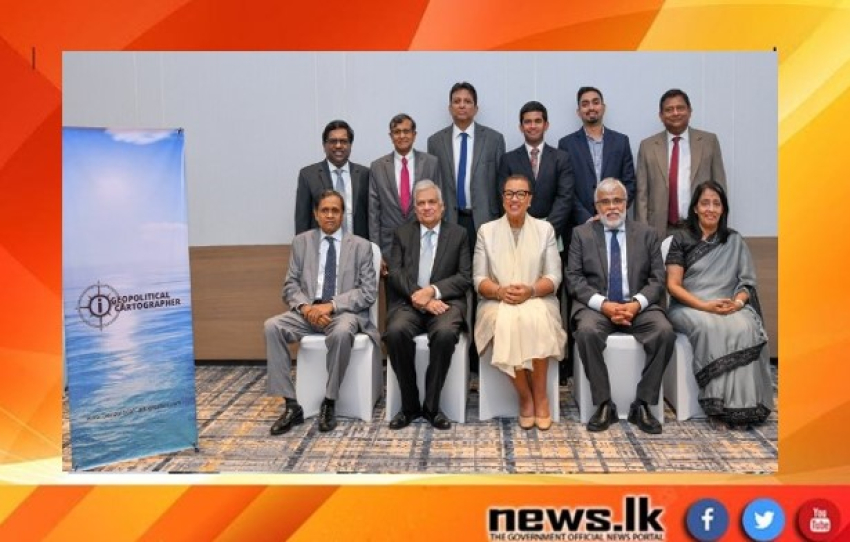The Geopolitical Cartographer was held on the theme of “The role of the Commonwealth in an Era of ‘Polycrisis’ “under the patronage of President Ranil Wickremesinghe, (03) at the Colombo City Centre.
Speaking further the Secretary-General said as a family we have responsibility for one another. A duty to each other, a shared love and a shared journey and you are not alone like the challenges you face.
‘I travel all around the commonwealth and the wider world and whilst every country and its direct experience and circumstances are different, they are similar challenges everywhere and you may feel that you are living in a country under pressure, but the reality is that we are all living in a world under pressure. All of us are tightly bound by a tangled knot of crisis-spanning global systems. A world living with the social political and economic consequences of COVID-19,’ she said.
Speaking at the session President Ranil Wickremesinghe said, ‘The first person to come here and to be invited here is none other than the Secretary General of the Commonwealth. She has been a good friend of Sri Lanka, a good friend of Asia, and Africa and she represents our thinking. But there's also another reason for her, the Commonwealth to be here. When we got independence, we first joined the Commonwealth. Our entry to the UN was blocked. It was only in 1955 that we became a member of the United Nations. But from the beginning, we have been with the Commonwealth. It was only correct that the Secretary General of the Commonwealth should be here on our 75th Anniversary of Independence. You were there when we got independence and you are here now. So it is to mark that occasion as she was invited here by the government to take part in the 75th Anniversary of our Independence, the President noted.
Following is President Ranil Wickremesinghe’s Full Speech:
It gives me great pleasure to be present here today with Patricia Scotland, the Secretary General of the Commonwealth for the inaugural lecture of the geopolitical cartographer. The geopolitical cartography is the outcome of a discussion or firstly, increasing the number of think tanks and research institutes in the country. Secondly, to focus on international affairs, thirdly, not merely to cover the whole range of international affairs, but to focus on the area which was of concern to us where we are located in the Indian Ocean, its geopolitical aspects. Its geo-economic aspects, its environmental aspects fall into either geopolitical or geo-economics.
And it was called the geopolitical cartographer because now the maps are drawn and boundaries are drawn not according to geography, but according to geopolitics. For a long time, we belonged to a region known as the Indian Ocean, and all of a sudden it became the Indo-Pacific. So that is geopolitical cartography. In the same way, Europe has a problem now with where to draw the boundaries between Russia and Ukraine. It keeps changing throughout the world. Various claims are made, but we have to learn now that cartography depends completely on geopolitics and nothing else. So we called the name geopolitical cartographer but was to discuss how geopolitics and geo-economics were changing the Indian Ocean, the most vital ocean in the world till about the 18th century. This was also the richest.
In time to come, before the end of the century again, you will find first the development of South Asia of Indonesia and Southeast Asia of the Middle East. And finally, the big development explosion in Africa, that's why the focus is completely on this new emerging region. And the first person to come here and to be invited here is none other than the Secretary General of the Commonwealth. She's been a good friend of Sri Lanka. She's been a good friend of Asia and Africa and she represents our thinking. But there's also another reason for her to be here on behalf of the Commonwealth. When we gained independence, we were admitted to the Commonwealth.
Our entry to the UN was blocked because the US had blocked some of the Soviet countries and in return, the Soviet Union blocked Sri Lanka. It was only in 1955 that we became a member of the United Nations. But from the beginning, we have been with the Commonwealth.
It was only correct that the Secretary General of the Commonwealth should be here on our 75th Anniversary of Independence. You were there when we got independence and you all are here now. So it is to mark that occasion as she was invited here by the government to take part in the 75th Anniversary of our Independence.
But today you're not here to listen to me speak. You’ll be here to see and listen to what Patricia has to say. So I would like to invite her to address all of you and the numerous crises that she is going to now explain and layout.
Thank you.



















